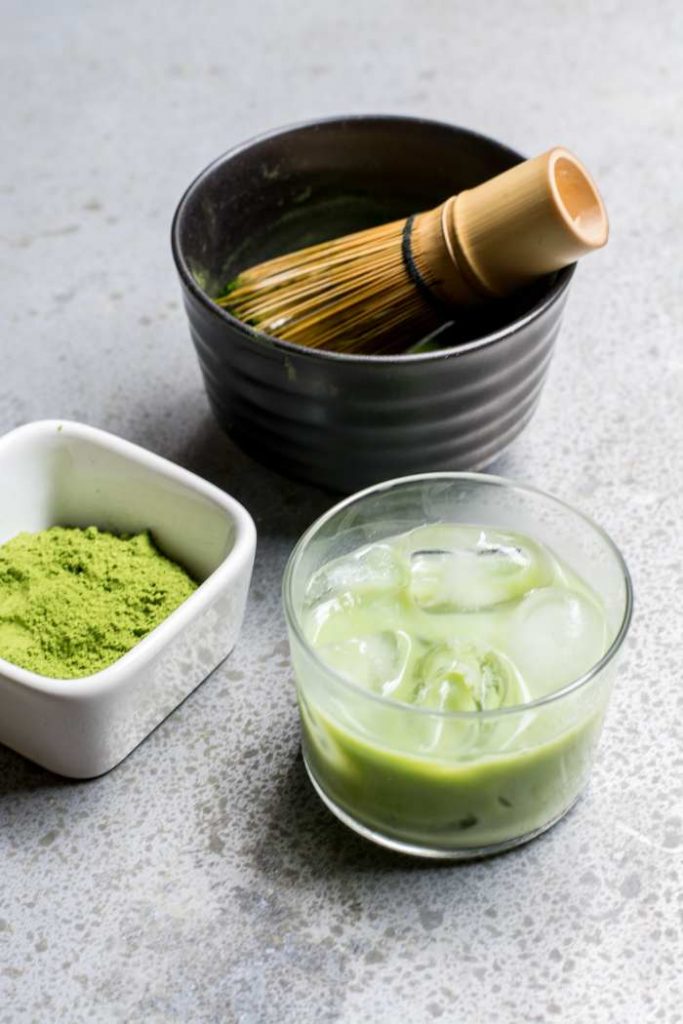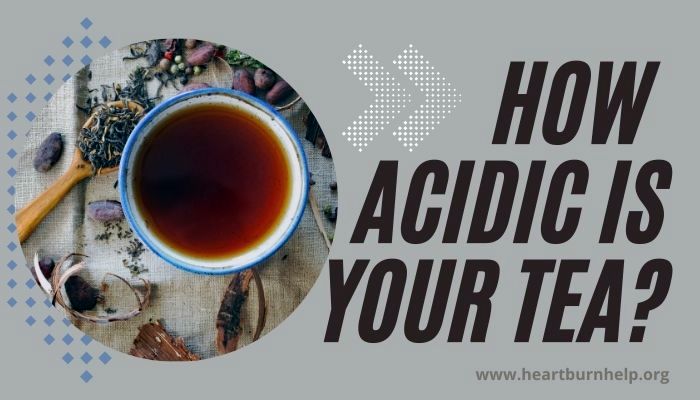A cup of matcha green tea has amazing health benefits. If you’re a tea lover and suffer symptoms of acid reflux, you need to consider more than acidity levels to determine whether your favorite tea will give you side effects.
Is Matcha Tea Acidic?
This article explains the acidity of matcha tea, health benefits and side effects, the relationship between acidic beverages and acid reflux, and which teas are best for acid reflux and gastroesophageal reflux disease (GERD) sufferers.
What is Matcha Tea?
Japanese matcha tea gets its name from the Japanese words “ma” which means powder, and “cha” meaning tea.
Matcha tea is made from the leaves of the Camellia sinensis tea plant and is a type of green tea. Green tea, including matcha tea, is grown in the shade. The leaves used for making regular green tea are dried in the sun, whereas matcha tea leaves dry in the shade.
The shade allows for high chlorophyll content to form, giving matcha tea a bright green color to its tea. Shade also enhances the potency of catechins beneficial to health.
Due to its high concentration of nutrients, matcha green tea is considered the highest quality tea (1).
Once dried, matcha tea leaves are ground into a powder, allowing more beneficial compounds to extract while the tea is steeping.
Health Benefits Of Matcha Tea
Matcha tea’s health-promoting properties are due to its high content of powerful antioxidants and anti-inflammatory substances.
Anti-cancer effects
The anti-cancer properties of green tea catechin epigallocatechin gallate (EGCG) have been well researched and may help prevent tumor growth in the gastrointestinal tract. EGCG is green tea’s most active and abundant catechin; matcha tea is its most condensed source (1).
Anti-inflammatory properties
Inflammation is part of many diseases. EGCG and other antioxidants may reduce inflammation (2).
Protects heart health
Antioxidant EGCG may protect against heart disease, preventing cardiac inflammatory changes by reducing oxidative stress and protecting against blood clots and heart attacks in heart surgery patients. It can reverse some effects of exposure to cigarette smoke on heart health in rats (1).
Antiviral properties
Green tea consumption may help prevent and regulate the immune response to infectious diseases. Most research on antiviral properties has been done on green tea, which shares many health benefits with matcha tea, but does have a different chemical makeup. However, some promising research has been done on the anti-viral properties of matcha tea, although more is needed (1).
Lower blood glucose levels
Matcha green tea catechins and other polyphenols may lower blood sugar levels, while EGCG may minimize starch digestion, slowing down the release of glucose into your digestive system. It may also help with weight loss (1).
Improved brain function
Moderate consumption of green tea is an effective way to promote clarity of mind and cognitive function. These health benefits are attributed mainly to epigallocatechin gallate (EGCG) (3).
Regular caffeine consumption may reduce the risk of cognitive decline by reversing oxidative processes and reducing inflammation, helping your brain maintain its normal function while aging (1).
Side Effects of Too Much Matcha Tea
Too Much Caffeine
Matcha tea has about as much caffeine as coffee. Too much caffeine can lead to anxiety, headaches, insomnia, irregular heartbeat, and high blood pressure (5). Caffeine also aggravates acid reflux symptoms.
Acid Reflux and Gastroesophageal Reflux Disease
Acid reflux and gastroesophageal reflux disease are common reasons why some people avoid acidic beverages.
Matcha green tea contains high levels of caffeine and tannins, which increase stomach acidity levels. And caffeine also relaxes your lower esophageal sphincter muscle. Both of these factors can bring on symptoms of acid reflux.
If you have mild acid reflux symptoms, you may be able to drink a cup of matcha tea occasionally, but if consumed on an empty stomach, it may cause stomach problems.
What Is Acid Reflux?
Acid reflux occurs when stomach acid backflows into your esophagus or food pipe. Heartburn is a burning sensation you may feel in your chest due to stomach acid irritating the lining of your esophagus.
Your lower esophageal sphincter is a muscular valve between your esophagus and stomach. Usually, it doesn’t let stomach acid and food reflux back up into your esophagus.
But if you get acid reflux, various factors may cause your lower esophageal sphincter to loosen, including caffeine, too much food, acid buildup in your stomach, or certain medications.
Suffering from acid reflux twice a week or more may mean you have gastroesophageal reflux disease and should consult a doctor. If left untreated, serious complications may develop.
Acid Reflux And Acid Levels Of Drinks
When considering if food or drinks are suitable to consume for acid reflux symptoms, acidity levels or pH levels are just one consideration.
For example, caffeine and tannins in matcha tea have health benefits, but they make your stomach produce more stomach acid, and caffeine also loosens your lower esophageal sphincter muscle. Matcha tea has high levels of both of these compounds, which are likely to aggravate your symptoms of acid reflux.
Ready-made teas, such as iced tea, are more acidic than homemade versions due to the preservatives needed to extend the shelf life of commercially made drinks (1). Sometimes these drinks have a high sugar content or use artificial sweeteners, which also trigger acid reflux.
Adding other ingredients to your cup of tea may also give you symptoms of acid reflux. For example, milk, sugar, artificial sweeteners, or the addition of spices can also cause problems if these foods trigger your acid reflux.

pH Scale for Tea
The pH scale, ranging from 1 to 14, measures acidity levels in food and beverages:
- a pH of 1 is the most acidic
- a pH of 7 is neutral, neither acidic nor alkaline
- a pH of 14 is the most alkaline or basic.
The table below shows you the different pH levels of common teas.
| Types of Tea | Average Acidity Level (PH Value) |
| Commercially made, ready to drink teas e.g. iced tea or sweet tea | 2.9 – 3.4 |
| Black Tea | 4.9 – 5.5 |
| Green Tea | 4.9 – 5.5 |
| Earl Grey Tea | 4.9 – 5.5 |
| Oolong Tea | 5.5 – 7 |
| Chamomile Tea | 6 – 7 |
| Peppermint Tea | 6 – 7 |
| Rooibos Tea | 6 – 7 |
| Hibiscus Tea | 6.5 – 6.8 |
| Fennel teas | 6.7 – 7.1 |
| Yerba Mate Tea | 6.7 – 7.8 |
| Ginger Tea | 7 – 7.5 |
| White Tea | 8 – 10 |
| Matcha Tea | 9 (approx.) |
Is Matcha Tea Acidic Or Alkaline?
Matcha tea is mildly alkaline with a pH level of approximately 9. Matcha tea is more alkaline than regular green tea due to its higher chloroform content.
It has a number of health benefits, but due to its high caffeine content and tannins, which can trigger symptoms of acid reflux, matcha tea is usually not recommended if you have gastroesophageal reflux disease.
How To Change The Acidity Of Matcha Tea
- Steeping time: a longer steeping time makes a more acidic tea—only steep tea for five minutes.
- Additional ingredients: the addition of milk, sugar, or artificial sweeteners
Best Tea For Acidity and Acid Reflux
Don’t rely on the pH scale to determine the best tea to drink if you suffer from acid reflux or gastroesophageal reflux disease.
For example, peppermint tea has a pH of 7, which has a neutral pH level; however, peppermint is a common trigger of acid reflux.
Another tea with a neutral pH that you’ll want to avoid if you have acid reflux is yerba mate, which has high caffeine content and tannins that increase stomach acidity levels, and caffeine which loosens your lower esophageal sphincter.
The amount of tea you can drink each day depends on the type of tea and the severity of your symptoms of acid reflux or gastroesophageal reflux disease.
Some of the best teas for acid reflux include:
- ginger tea
- chamomile tea
- licorice tea
- fennel teas
- slippery elm tea
- marshmallow root tea
- green tea
- oolong tea
- lemon tea
- turmeric tea
FAQS About “Is Matcha Tea Acidic?”
Are matcha lattes acidic?
Matcha lattes are made from matcha tea and milk. Milk is acid-forming due to the lactic acid, so milk will reduce the pH level depending on how much milk is added. The fat in milk coats your stomach, so if matcha tea gives you an upset stomach, a matcha latte might be OK. The only way to know for sure is to try it for yourself.
Is matcha tea less acidic than coffee?
Yes. Matcha tea is less acidic than coffee. Matcha tea has a pH level of around 9 which is mildly alkaline, whereas the pH of coffee is about 5, which is mildly acidic. Decaffeinated coffee is slightly less acidic than regular black coffee. Coffee with milk is even less acidic; however, acidity levels will depend on the type of milk and how much is used.
Is Matcha easier on the stomach than coffee?
Matcha tea is mildly alkaline, compared to coffee which is mildly acidic. If you are prone to stomach upsets, matcha may suit you better. However, suppose you suffer from acid reflux symptoms. In that case, matcha tea is likely to cause problems due to its high caffeine content and tannins, which increase the production of stomach acids, and caffeine also loosens your lower esophageal sphincter muscle increasing your susceptibility to acid reflux.
Summary: Is Matcha Tea Acidic?
Matcha tea is mildly alkaline with a pH level of approximately 9. It has amazing health benefits, including anti-cancer, anti-viral effects, antioxidant properties, and anti-inflammatory properties. It may protect your heart and brain function and reduce blood glucose levels.
But if you suffer from symptoms of acid reflux, matcha tea probably isn’t your best choice, in which case, click on the image below to find a better tea that will soothe your digestive system.

